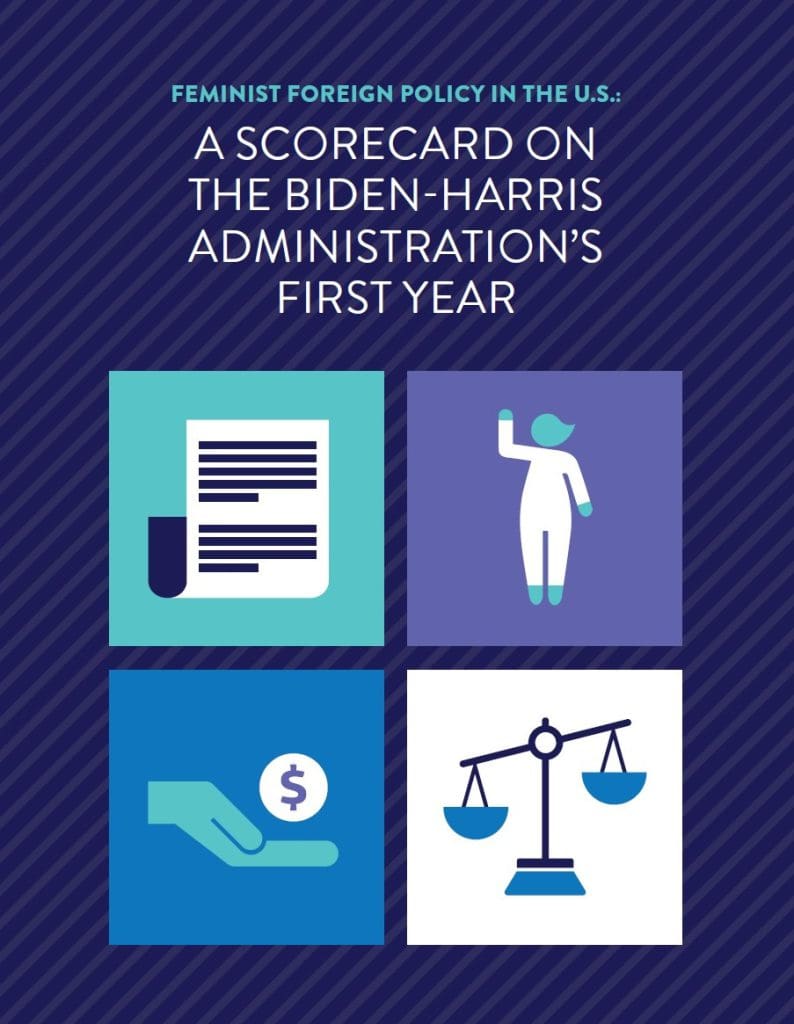
Feminist Foreign Policy in the U.S.: A Scorecard on the Biden-Harris Administration’s First Year
 The Biden-Harris administration took office in the wake of a number of reversals of women’s rights, human rights and gender equality efforts by the U.S. government, promising to “build back better.” 2021-2022 has also been a time of global reflection on the status of women and girls around the world.
The Biden-Harris administration took office in the wake of a number of reversals of women’s rights, human rights and gender equality efforts by the U.S. government, promising to “build back better.” 2021-2022 has also been a time of global reflection on the status of women and girls around the world.
In this context, The Coalition for Feminist Foreign Policy in the United States has released a scorecard to track U.S. progress toward promoting gender equality at home and abroad. This 1-Year scorecard, following the initial 100-day scorecard, documents the progress made by the Biden-Harris administration across four areas as measured against the executive actions called for in A Feminist Foreign Policy for the United States: A Memo to the Next Administration (the Memo) and the Coalition’s signature policy paper, Toward a Feminist Foreign Policy in the United States. It also includes an overview of what is left to be done, as well as additional, relevant actions taken by the administration that were not included in the Coalition’s recommendations but merit mention and credit in this context.
Key Findings:
The Biden-Harris administration earned an overall score of an 50%.
In the first annual scorecard, the Coalition took an in-depth look at four categories of recommendations to track the administration’s progress: policy articulation; leadership and structures; funding; and accountability. In the areas of policy articulation and leadership and structures, the administration has managed to move over 50% of the Coalition’s recommendations forward against a backdrop of a persistent global pandemic and the economic fallout, political upheavals and other national and global challenges. That said, most of the changes thus far are relatively surface-level. In order to create a foreign policy that is feminist in both scope and practice, the power balances in decision-making must be shifted.
The administration did very well in terms of accountability, based on what has been feasible in its first year, scoring 100% on the three criteria the Coalition scored. This grade was the result of specific, time-bound objectives developed by the administration, including the creation of a gender strategy, an annual report on the implementation of the strategy, the designation of agency representatives to the Council and semi-annual agency reporting on strategy implementation. Unfortunately, in terms of funding, the administration fell far short of commitments necessary to effectively and efficiently implement meaningful policy changes – implementing just two of eleven (14%) recommendations put forward by the Coalition.
The administration’s commitments articulated during its first year are signposts that it takes these issues seriously and is working to advance America’s approach to advancing gender equity at home and abroad. However, the administration has not provided sufficient leadership, personnel or resources, outside of a limited scope of gender-focused offices, to make the essential changes needed to implement a feminist foreign policy, or to become a global leader on gender equality. Going into year two, the Coalition calls on the administration to dig deeper and turn rhetoric into action.
Key Recommendations
Looking ahead, to support key components of a feminist foreign policy, the Coalition recommends that the administration:
- Concentrate more attention on integrating gender into issues of U.S. foreign policy, including defense, development, diplomacy, immigration and trade. While the Gender Strategy includes these issues, the strategy is in a silo, and other policies and strategies focused on climate change, economic opportunity, global health and security, etc. are largely gender-uninformed;
- Confer more power and resources to the White House Gender Policy Council and elevate these issues within the portfolios of foreign policy leadership, including the Secretary of State, the Secretary of Defense, the USAID Administrator, the Director of National Intelligence, etc; and
- Provide funding for the activities needed to implement the Gender Strategy and agency implementation plans.
Read the Press Release
The Biden-Harris Administration’s First 100 Days: Toward a Feminist Foreign Policy?
Related Resources
Coalition for a Feminist Foreign Policy (2022). Feminist Foreign Policy in the U.S.: A Scorecard on the Biden-Harris Administration’s First Year. Washington, DC: International Center for Research on Women.
